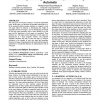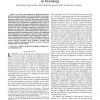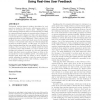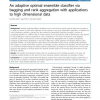378 search results - page 19 / 76 » Learning to Rank with Supplementary Data |
MEDES
2009
ACM
14 years 17 days ago
2009
ACM
The main goal of web pages ranking is to find the interrelated pages. In this paper, we introduce an algorithm called FPR-DLA. In the proposed method learning automata is assigned...
TNN
2010
13 years 2 months ago
2010
In recent years, learning from imbalanced data has attracted growing attention from both academia and industry due to the explosive growth of applications that use and produce imba...
SIGIR
2008
ACM
13 years 7 months ago
2008
ACM
Some applications have to present their results in the form of ranked lists. This is the case of many information retrieval applications, in which documents must be sorted accordi...
CIKM
2010
Springer
13 years 6 months ago
2010
Springer
Traditional machine-learned ranking algorithms for web search are trained in batch mode, which assume static relevance of documents for a given query. Although such a batch-learni...
BMCBI
2010
13 years 8 months ago
2010
Background: Generally speaking, different classifiers tend to work well for certain types of data and conversely, it is usually not known a priori which algorithm will be optimal ...




